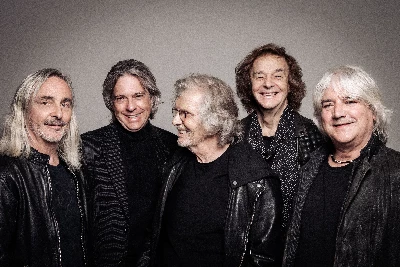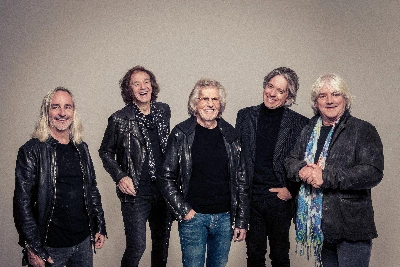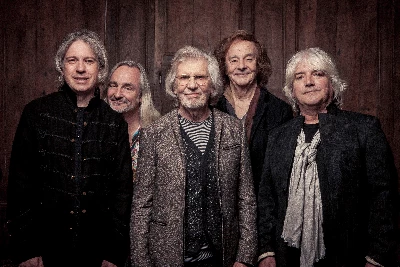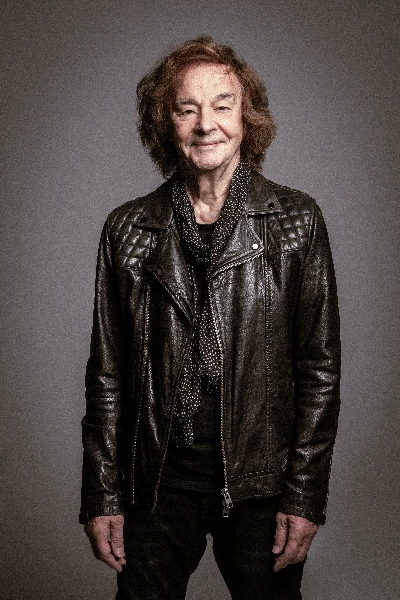published: 19 /
12 /
2024

Vocalist Colin Blunstone talks to Lisa Torem about the Zombies’ upcoming UK and US tours, special guests and how the music business has changed since the Sixties.
Article
The original members of The Zombies had already gone their separate ways when fans and critics discovered future gem, ‘Odessey and Oracle,’ and the layered harmonies of ‘The Time of the Season’ saturated the radio airwaves.
It took a reunion for Rod Argent and Colin Blunstone to discover that The Zombies catalogue was still currying favour among their many fans.
PB: Let’s talk about The Zombies upcoming UK 2024 tour. Your guest. Paul Weller, who is among the other guests, cited The Zombies as his favourite band and even recorded ‘The Time of the Season’. How did having Paul as a special guest come about?
CB: I’m absolutely thrilled about all of the guests that are coming. Paul always cited ‘Odessey and Oracle’ as his favourite album. He’ll famously introduce the subject to people and if they haven’t heard ‘Odessey and Oracle‘ he will probably buy them a copy.
We played ‘Odessey and Oracle’ live in 2008 at Shepherd’s Bush and Paul came all three nights. I spent a longtime talking backstage to him. He’s always been interested in The Zombies in general, but in ‘Odessey and Oracle’ in particular.
So, we mentioned doing a show at the Barbican, and asked him if he’d like to come along and perform, and he said, “That will be an honour.” Those were the words he used.
PB: And on ‘The Different Game’ tour in April, you also had special guests: Wendy Colonna and Bruce Sudano. Is it typical for The Zombies to feature a guest?
CB: The one in London at the barbican is a one-off where we, definitely, had guests. The one with Wendy and Bruce—they played an opening set, as opposed to being guests with us. They opened the show and they were very, very good as well.
PB: When choosing guests or warm-up acts, what characteristics do you look for?
CB: it’s a combined effort with our manager and company. We have conversations between us and come up with an answer about the opening act. It’s not one person dictating, really.
PB: You’ve added Poland on the 20th of June. You’ll be touring there for the first time?
CB: It is. We’ve never played in Poland before so I’m really looking forward to that. Yesterday I did a number of interviews with Polish media people. They’re really excited that The Zombies are coming to play in Poland and we’re really excited.
We played in the Ukraine and we played in Germany. We’ve played in most of Europe, really, but we’ve never played in Poland.
PB: How has the touring process changed for you over the course of your career? Has the self-care been different? Are you more relaxed. Equally excited?
CB: I think there’s always been excitement about playing live and touring. Touring has changed. The whole music industry has changed out of all recognition to when I first started doing it.
Especially when we came to America, we’d be doing a “package tour” with fourteen other acts, and probably just playing two or three songs. But now, generally, speaking, we tour on our own and we’ll play for an hour-and-a half or an hour-and-three quarters. It’s different.
But I think we’ve put together a professional team of people to supervise our touring now. And it is crisp and seamless; the way we get around at-the-moment. We’ve got good people with us. I really enjoy it.
One of the other things: we’re a band. We have to carry our gear with us. We have to get our stuff around the country when we’re playing for nearly two hours instead of ten minutes. A lot has changed.
As you get older, you have to look after yourself a bit more. When you’re younger, it’s just a wonderful adventure—one long party. But when you get older, you do have to look after yourself, and stay hydrated and get plenty of sleep. And most of the musicians that I know live by those rules. It’s not as wild as it used to be when we were young.
PB: You’re not throwing televisions out of the window.
CB: Not usually (laughs). We’re very focused on the show. I think people would be surprised. The whole day revolves around doing the show. It’s light-hearted. It’s fun. We all get on, really, well. We know what we’re there for. We know what we’re doing.
I was going to make a funny remark, but… Seriously, I think it’s a gathering of your senses. As the tour goes on, especially after the first four or five nights, you seem to get into some kind of process. You seem to get on automatic pilot. You know what you’ve got to do, where your spot is on the stage and how to get there, and what the first song is, and that’s what is going through your mind.
But once you’ve played a few nights, the rest of it is automatic. In some ways, that makes it more enjoyable because you can just concentrate on the performance. So, a lot of it is automatic after the first three nights.
PB: A number of fans and music writers have expressed the opinion that The Zombies have been overlooked but have finally gotten their due. Have you ever felt overlooked as a band, and if so, how would you describe the legacy now?
CB: Especially at the end of the ‘60s, it seemed as if the band had run its course. I’m not saying we were overlooked but there didn’t seem to be a lot of interest in the band. That’s why the band ended.
Rod and I had both thought that The Zombies had been forgotten in 1999. We were incredibly surprised, but pleasantly surprised that that had not been true after we started touring again. That’s why we started playing more Zombies’ tunes.
When we first got back together, we didn’t call ourselves The Zombies and we didn’t play many Zombies tunes. We both had solo careers and we focused more on that side of our careers. As I said before, we were very pleasantly surprised that there was so much interest in The Zombies’ back catalogue. So we started to play more songs from the past.
Having said that, Rod and I have been mostly interested in the future. What comes next? We had, actually, recorded four or five more albums since we got back together again. It was incredibly encouraging; the reaction we’d get to those songs. So, I’m not sure that we ever felt overlooked, I just thought that the band had run its course and possibly was a bit forgotten. It’s proved that I was wrong—The Zombies weren’t forgotten.
I think the most exciting part of my career is to see this new incarnation of The Zombies. We’re probably bigger now than we were in the ‘60s, strangely enough. And we’ve just done that by continually touring. That’s just been word-of-mouth. We really haven’t had a hit single, although the last album did chart in the US. and the UK, but the other albums didn’t. So, it's just through word-of-mouth that we’ve reached the level that we’re at, at the moment.
PB: Regarding group dynamics, there has been such an appreciation among the past and present members and the related ensemble. You talk so respectfully about each other, and to that end, you took part in a tribute to arranger Christopher Gunning, along with The Philharmonic Orchestra. Christopher arranged material for one of your solo records. What was special about Christopher Gunning as an arranger?
CB: He was not only a wonderful arranger, but a great writer, as well. I think, he’s written fourteen symphonies. He’s admired by everyone who has listened to him play his classical music. He has the respect of the whole industry. With his arrangements, he was very adventurous, very bold, very brave.
The arrangements that he did on my ‘One Year’ album was very successful in this country and had a huge single on it, ‘Say You Don’t Mind’ which was written by Denny Laine. Chris Gunning did the arrangement. It’s not like anything else ever.
The chart is a 21-piece orchestra. No percussion. No electric guitars. No keyboard. Nothing. A string orchestra playing a rock-and-roll tune. I loved it but I didn’t think it was a commercial track. It went on to be a top-twenty single in the U.K. That’s the sign of a craft writer; a craft arranger coming together, and Chris Gunning certainly was that.
It was a great privilege to be in a concert for him. I really enjoyed it.
PB: You talked about the ‘Less is More’ project on your Facebook page. I love the idea of a stripped-down tune that lends itself to a grand arrangement. We get to experience the melody, harmony and lyrics: the bones of the song. What songs lent themselves to this project? All the bands’ songs? Some songs?
CB: I think all good songs lend themselves to this process. The ‘Less is More’ is an EP, really. I wanted to play a song to one of my managers--we have two. I played this song to Cindy DaSilva. The version I played was just me and guitar, and when she heard it, she thought it really had an appeal, and that people would want to hear the song like that. It was her idea to put the five songs on there with just me and guitar.
What songs lend themselves to that approach? I would say, all good songs lend themselves to that approach.
It’s when a song is more arrangement than song; the sound is so attractive and commercial that you like to listen to it, but when you, actually, analyse it, there’s not a lot of song there. When you play it on guitar or piano, there’s not much for anyone to listen to. It’s just an arrangement, just a series of recorded sounds.
I’ve had this discussion with Rod Argent because, by now, we’ve done quite a few concerts. I always say to him, when he plays his songs to me, it’s just him and the piano and they sound great. If we start out like that, and then build it up to a record, it’s fine. It means we can always play it with just piano and voice and it sounds great. It’s because it’s a well-constructed song and they stand up to the stripped-down approach.
PB: The Zombies perfomed ‘Odessey and Oracle’ on the ‘Something Great For ’68’ Tour with The Brian Wilson Band. Why did you decide to work with Brian Wilson for that tour?
CB: We were given the opportunity and all of us are huge fans of Brian. It’s not the kind of opportunity that you would turn down. It was incredibly exciting. I really loved their show.
One of their highlights was that they would do a warm-up before they went onstage and they would usually sing, just a cappella, a track, ‘In My Room.’ It was absolutely gorgeous. They would do that every night.
It was wonderful to tour with Brian. He is one of the absolute icons of contemporary music. It was a thrill to be touring with him.
PB:: Brian was a big fan of George Gershwin and his work. Early on, The Zombies recorded Gershwin’s ‘Summertime.’ Do you believe you shared a love of the Great American Songbook?
CB: Yes, I think we did. It just reminded me, that when we toured with Brian, we didn’t, actually, play ‘Summertime,’ but we are playing ‘Summertime’ at the moment, and it would have been interesting to play it, and seeing what he made of it.
PB: What was the influence that The Beach Boys had on The Zombies?
CB: We were influenced by their vocal harmonies more than anything else. Maybe their recording processes. Their records sounded so wonderful. We could only aspire to achieve what they achieved. It’s something to aim for. But those magical harmonies were definitely an inspiration for us.
PB: Regarding the ‘Something Great for ’68’ tour, a reviewer wrote, “No song got a warmer welcome than, ‘This Will Be Our Year.’ It’s one of my favourite too. The song has a hopefulness, but an appreciation of the past. What is it like for you to sing this song now?
CB: I did sing this when it was first recorded, but I never sang it live. We never played it in a concert. at the time. So, with this incarnation of The Zombies, although we’ve been playing it for many years now, it certainly was a very new thing for me. I think it was a wonderful song. It’s a Chris White song.
Both Rod Argent and Chris White were incredible at songwriting. We recorded that song in 1967. They just wrote wonderful song after wonderful song for about five or six years. And I’m not saying they don’t write wonderful songs now, but there was just something about that period that was very special. Chris White actually wrote more songs on ‘Odessey and Oracle’ than Rod did and they’re all great songs.
I think The Zombies have always taken their influence from such a wide spectrum of music and it’s been one of the strongest strengths at times, and sometimes it can be a bit of a weakness as well, because people like to categorize the kind of music that you play.
But when you take your influences from classical music and jazz and rhythm and blues and pop music, it can, sometimes, confuse people and they can’t categorise you. That can lead to you losing certain media outlets for certain kinds of promotion and marketing. They don’t know where to put you--what kind of radio commercials you should be on, what kind of magazines you should be in. it was one of The Zombies’ biggest strengths that we took our influences from such a wide spectrum, but it can also have its downside as well.
PB: It seems like America is guilty of that kind of branding.
CB: It can be, but I think that America leads on this, in fact. It leads; most countries follow. I think the UK. famously follows in many things, twenty years after America. We now have many radio stations, which we didn’t have.
When The Zombies first started, we only had three radio stations and they were all BBC. One was light music. It wasn’t rock and roll. It wasn’t records. It was a lot of orchestral music along with a talking station and one was a classical music station. So, it’s very different.
We now have many radio stations. Most of them will play quite a strict playlist. They categorise what kind of music they play: classic rock or Top 40. They’re very specific in the kind of music that they play.
It quite interests me because I’m sure that there are a lot of listeners who would like to listen to a wider spectrum of music. I enjoy that. I don’t want to just listen to music from the ‘60s or the ‘90s, or all the top 40.
I liked to listen to the radio in the ‘70s when they had their strength. They had DJ’s who were dedicated to the music. They were music fans. They would play the music that they loved.
Now, it seems the radio has such a strict play list. Most of the DJs can’t play what they want to play. And it’s the same in the UK and the same in the States. I think it’s a shame.
PB: In 2004, The Zombies reformed to do a US tour and performed at the Sunset Strip area in Los Angeles. You attracted a multi-generational audience then and the trend continues to this day. How do you account for this?
CB: I can’t be sure. But it is true. People that are coming for the first time are really surprised at the cross-generation of ages. It’s a lot younger than they think it’s going to be. There are people there that have followed us from the ‘60s, too, and we’re really grateful for that. But for some reason, we do attract a lot of young people.
I think there are a lot of reasons. There were so many great songs that were written in the ‘60s. And yet, there’s a kind of mystery about The Zombies. Why did they finish when they finished?
And then, after they finish, they get this huge number one, hit record, ‘The Time of the Season’ and they don’t get back together again. Why is that? There’s a bit of a mystery and intrigue about The Zombies that appeals to young people and brings them to our concerts.
The other things is, they’re such a good band. Really good musicians. Over the years, there have been one or two changes in the lineup, but it’s always been a really good band, and I get the pleasure of singing in front of that band every night.
I’ve sung with many bands, and I know that that band is really special. It’s a really good band, regardless of age. When people come to a concert, they don’t care about age, as opposed to radio stations, who do. They don’t care about age. They just want to hear good players play. And this band is a really, really strong band.
PB: The Zombies are versatile. You’ve done cruise ships, indoor venues and outdoor festivals. You and Rod Argent have done tiny desk concerts. You seem comfortable in many types of situations.
CB: I quite like playing a variety of venues. Sometimes, we’ll play in an intimate club or something like that. There are subtle differences in playing a club like that, as opposed to a festival or a big theatre.
The cruise ship is unique because everyone on that ship is a music fan and you are traveling with your audience as well. Everyone on that ship has seen many bands, so you really do have to be at the top of your game.
The other thing is, you’re traveling with your audience. You’re just as likely to have breakfast with your audience as with anyone else. It keeps you on your toes. It really does. On the good side, it actually helps you interact with the fans and it is great fun.
PB: How does the rest of the year look for The Zombies?
CB: We’re touring in the UK starting at the end of May. We’re playing four festivals in the summer. Then, we’re coming back to the States at the end of September. In early November, we have a long weekend at St. Albans, where we came from. We did it last year and it was absolutely fabulous.
It will mostly be in the centre of St. Albans, so if you come, you can walk to everything. There may be a Zombies Concert. There may be a solo band concert that will require going to the next town, but they’re arranging free transport for that.
But in general, there will be a question and answer and a live set in front of two-hundred people, or something like, in the central museum, because right now there is an exhibition of The Zombies in the St. Albans Museum. People can look at the exhibition and then come through and hear a Q & A with the original Zombies.
And then, there is one thing after another. There was a record shop signing and a book shop signing. There was a tour run by Hugh Grundy, the drummer of the original band. Chris White. the original bassist, gave a talk and I did a signing at the place where one of my album sleeves was photographed.
It’s a lovely place. Originally, it was a Roman town. It was the main Roman town when the Romans invaded Britain. It was called Verulamium, so there’s a lot of history here.
All of the walks for these different occasions were set up for people. There are Edwardian streets. They are walking among Roman Ruins when they come to see me in this setting.
I did an album called ‘The Ghost of You and Me’. On the front cover, I’m standing in front of a big, old, gnarled tree. People came and found me there on this Saturday afternoon. It was really simple things, and we did a bit of a question and answer.
But right next to me were the remains of a Roman Ruin from around the time of Jesus Christ; two thousand years old. There was a lovely lunch in a Greek restaurant and Tom Toomey, the guitarist, played a concert on a Sunday afternoon. Steve Rodford, the drummer, played a concert on Sunday night.
The lovely thing for me, was that I did the Q & A on Friday night, and I played four or five songs with Tom Toomey. But after that, I didn’t have to do very much so I became one of the people, just enjoying the festival.
I really did enjoy it. It was great fun, and as I said, we’re doing it again. You might get three generations of the same family, although that won’t happen all the time. The details will be on Facebook and all other social media.
PB: Thank you.
Photos by Alex Lake
The Zombies tour the UK in 2024, for more information and tickets go to www.thezombiesmusic.com
Band Links:-
https://www.thezombiesmusic.com/
https://en-gb.facebook.com/thezombiesm
https://twitter.com/TheZombiesMusic
http://www.colinblunstone.net/
https://en-gb.facebook.com/colinblunst
https://twitter.com/colinblunstone
Play in YouTube:-
Have a Listen:-
Picture Gallery:-


